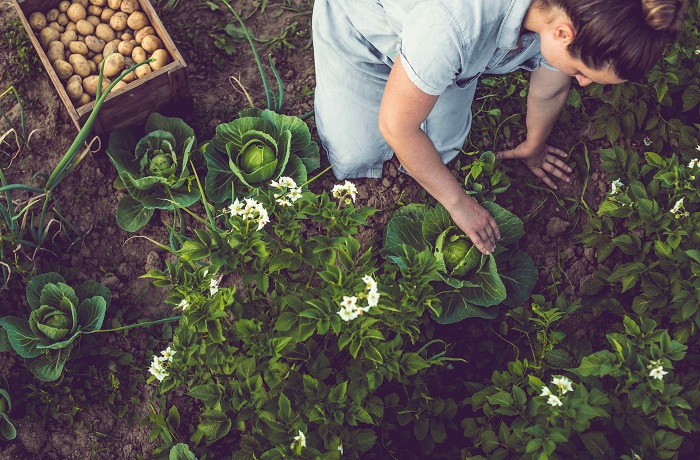
Gardener’s Guide on How to Choose the Right Seeds
If you want to grow your own food, how do you know which garden seeds to choose? Do you know what the different labels and claims mean? This guide from a top gardening expert will help you select the right seeds, so you can grow healthy plants that nourish a healthy life.
By Stacey Murphy
Growing your own vegetables and herbs can help you lead a healthy lifestyle, free from toxic chemicals and preservatives — and free from chronic diseases, too.
And seeds are where it all starts.
But when you start reading those seed packets, you see words like hybrid, open-pollinated, organic, conventional, naturally grown, and heirloom.
What do all the labels on seeds mean? And what do they mean for your health and your family’s health? Is there a right or wrong one? What happens to your health if you choose the wrong one? Who can you ask that will help you understand? Aye, overwhelm!
The 3 Main Types of Garden Seeds

The three main types of seeds are determined by how the seeds were grown or bred. They’ll either be open-pollinated, hybrid, or GMO.
While it is possible to have a combination seed that is both open-pollinated and hybrid seed, beware of information that groups hybrids and GMOs together. They are both man made, but they are VERY different!
Once we explore the three main types of garden seeds, we’ll dive into additional descriptions you may see, such as heirloom, organic, conventional, and naturally-grown.
Seed Type 1 — Open-Pollinated
Open-pollinated means that pollinators, like insects, birds or wind, spread pollen, and your seeds are a result of that pollination.
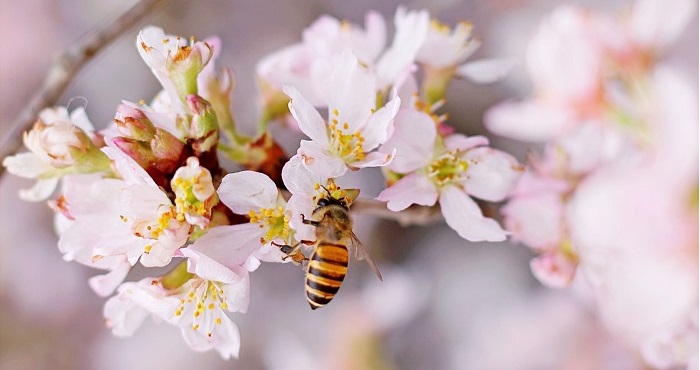
Why Choose Open-Pollinated Seeds?
While they can be a bit harder to find and more expensive, open-pollinated seeds can produce plants that look and behave just like the parent plant.
This is called “true-to-type.” Which is great when you have a flavor that you adore, and you want to continue growing it! With “true-to-type,” you’ll always know what you’re going to get from your plant.
While not all open-pollinated seeds are heirlooms, all heirloom seeds are classified as open-pollinated and are passed down from generation to generation as part of a cultural heritage. If you grow heirloom varieties, you’ll be eating almost the same exact food that was eaten in the time of your great, great grandparents.
But what if an ant accidentally cross-pollinates a zucchini and a pumpkin? The resulting seeds are open-pollinated because it happened in the wild, but they’re also a hybrid.
So while some open-pollinated seeds are “true-to-type,” others are hybrids. This happens all the time in small gardens, and it’s why there are so many strange and delicious variations that exist!
While these open-pollinated anomalies are technically hybrids, a seed packet labeled as a hybrid means people intentionally created it.
Seed Type 2 — Hybrids
Hybrid seeds (typically labeled F-1 by seed companies) refer to two plants being cross-pollinated intentionally by humans to create desired qualities — such as a sweet flavor, high yield, disease resistance, or heat tolerance.
Humans have been making hybrids for centuries to make it easier to predictably grow food that’s tastier, more abundant, and/or better suited for travel or storage.
Cross-pollinating is as simple as using a paintbrush to move pollen from one plant to another… just like honeybees.
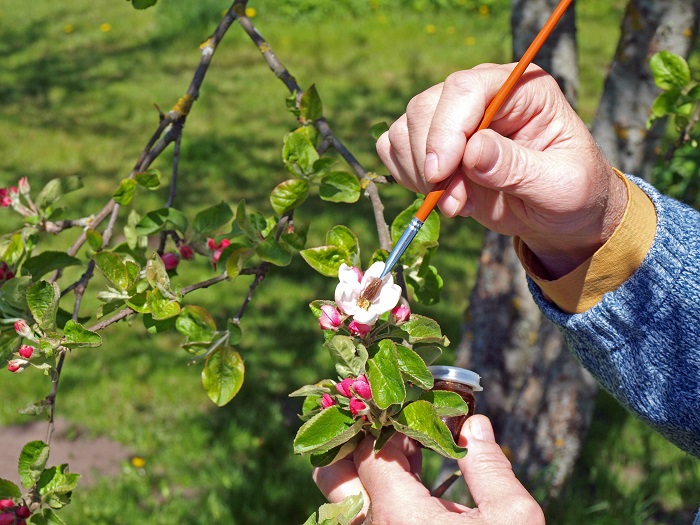
Why Buy Hybrid Seeds for Your Garden?
A lot can go wrong in the garden, and hybrids can stack the deck in your favor. If you’re just getting started growing food for the first time, you may want high-yield hybrids to increase your odds of a successful garden.
For example, if you have a wet climate, you may want to look for tomato varieties that are resistant to fungal diseases. This way, you can enjoy more tomatoes each season and reduce the potential of your tomato plant succumbing to common fungal diseases like blight or leaf spot.
You can sometimes get the same effect by planting open-pollinated seeds and saving the seeds each year until the variety adapts to your local climate naturally. However, climatic adaptation of open-pollinated seeds takes a couple of seasons (if it even works for the variety you choose) so the human-made hybrid can pay off in the short run.
Can You Save Hybrid Seeds from Your Garden?
If you plant your garden with hybrids and then save seeds from those plants, the next generation may or may not have the same traits you started with.
If you like surprises and have space to experiment in your garden, it’s fun to see what happens. But it is very unpredictable.
Let’s say you take a hybrid tomato plant, capture two seeds from it, and plant them. One of these seeds might grow into a plant that produces very little fruit — but with flavor that’s very similar to the hybrid before it. And the other might give you a good amount of delicious fruit that looks and tastes nothing like the original hybrid.
So you CAN save hybrid seeds… just know that you’re in for a surprise!
Seed Type 3 — How are GMOs Different Than Hybrid Seeds?
The final type of garden seeds are GMOs, or genetically modified organisms. Most recently, these seeds have been rebranded as BE (bio-engineered) seeds.
GMO seeds cannot happen in nature. They require a high-tech, gene-splicing lab where the DNA of the seed itself is altered.
Anytime you hear someone tell you that hybrids are similar to or no different than GMOs, here’s what you need to know: They are completely wrong…
Whereas hybrids cross two related plants, GMOs cross genes from different kingdoms!
Many GMOs splice bacteria genes with plant genes, with the goal that these plants can later be sprayed with toxic herbicides without the plant itself dying. The most popular of these herbicides, glyphosate (the primary active ingredient in Roundup) is a probable carcinogen, an endocrine disruptor… and it’s also been patented as an antibiotic.
“Other GMO seeds have been engineered to produce the pesticide “Bt” in every cell of the plant. When certain bugs eat these plants, their stomachs split open, and they die.
Because of the uncertainty of the health risks of GMOs, many home gardeners smartly choose to grow non-GMO seeds.
How to Avoid GMO Seeds in Your Garden
It’s easier than you think to keep GMOs out of your home garden!
While GMOs make their way into many additives, enzymes, flavorings, and processing agents, there are currently only 10 plants that have GMO versions on the market: corn, cotton, soybeans, alfalfa, papaya, zucchini, summer squash, sugar-beets, canola, potatoes, and apples.
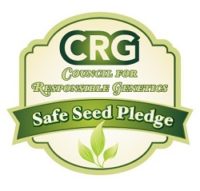
When you’re ordering seeds, take a look: Many seed companies that serve the home garden market have agreed not to sell GMO seeds by taking the Safe Seed Pledge.
Currently, the only company that we’ve seen supplying GMO seeds to gardeners is Semini Brand seeds (a subsidiary of Monsanto / Bayer). If you look at the Semini website, the GMO versions of summer squash and corn are all labeled “B” for biotech.
What About Organic, Non-GMO, Conventional and Naturally Grown Seeds?
Now that you know how each of the three types of garden seeds was created, you might see one of these other terms on a seed packet. And you may have already seen these labels on the food you buy at the grocery store, too.
Why Conventional and Naturally Grown Mean Nothing
There are no standards or checklists for these words to be used on seed packets.
Naturally grown might sound like a good thing… but it means nothing. And conventional is just a word that people use to describe what is not certified organic.
What Does Organic Mean?
Organic seeds are harvested from certified organic plants. This means the parent plant has met the organic requirements for that territory or region.
In the United States, you will see the USDA organic label, which prohibits certificate holders from using non-organic sprays and GMO’s. So in the U.S., there is no such thing as an organic GMO.
Some small-scale farmers grow seeds organically, but don’t pay for organic certification because the certification process is costly. Typically, a seed company will tell you when that is the case. However, they have no way to prove that the seeds are actually organic, so if you buy seeds that claim to be organic but aren’t certified, you are taking the grower’s word for it.
If you want more information about your seeds, simply ask the company. And if they hesitate to answer or you don’t feel comfortable with their answers, you may want to look for other companies that inspire your trust.
If You Buy Conventional Seeds and Grow Them Organically, Is Your Food Organic?
So why not just buy the cheaper conventional seed and grow it organically?
Well, you could. And with the addition of non-GMO labels (like Project Verified NON-GMO), many people are happy doing just that.
There’s a variety of research about how much or how little toxins are left over in seeds of a plant that’s grown conventionally.
Most likely, it’s what happens after planting that matters most. But some toxins could persist. And many home gardeners want a totally clean product and prefer to go organic all the way.
What Kind of Seeds Will You Grow in Your Vegetable Garden?
Most home gardeners grow a mixture of open-pollinated, hybrid, and heirloom seeds. The decision typically comes down to taste, preference, and values. And those may change from season to season.
When you know what the labels on your seeds packets mean, you can make informed decisions. This will help you to become a steward not only of the land but also of your long-term vitality.
How to Choose Seeds for Your Climate
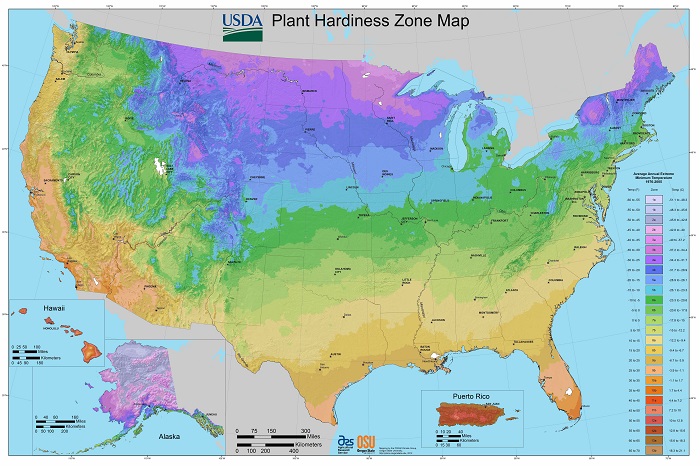
Your climate zone and time of year plays a big role in having a successful garden.
The first thing you should do is to find out what climate zone you live in. This will help you choose the best plants to grow for your area and learn when you need to plant.
This online tool can help you find your zone if you’re in the United States or several other countries.
When you know your climate zone, you can find a planting calendar for your area to show you which plants grow well in different seasons. Planting calendars will also often tell you what month you should start your seeds.
You can also research what’s been traditionally grown in your area and look for local seed companies. Other things you need to consider are how much sun your garden will get and the size of your planting space.
Seed packets should tell you important information, like if the plant needs sun, shade, or partial shade.
How to Choose Seeds for Your Tastes and Lifestyle Preferences
You can choose varieties of fruits and vegetables that suit your needs. Each variety comes in many different sizes and types. You may focus on flavor, a specific size, high yields, fast growth, or other priorities.
You probably want to focus on things that you and your family like — but it can also be good to experiment and try new things.
When selecting your garden seeds, be sure you mix up your selection. It’s best to grow a variety of crops. Biodiversity prevents pests and soil degradation. A diverse harvest also means more nutrients for you and your family.
Growing Your Own Food Is A GREAT Idea
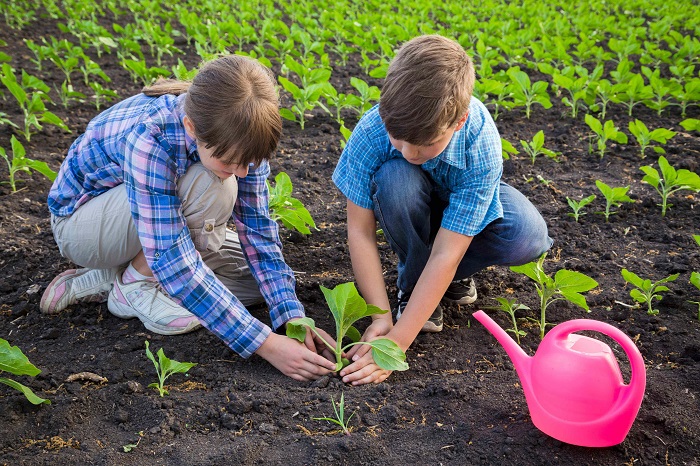
Gardening is good for your mental, physical, and emotional health. It can save you money. And the fruits of your labor should taste pretty good, too!
Tell us in the comments below:
- Have you grown a garden?
- What are your favorite garden seeds and varieties?
- How do you select and save seeds?
Wow this is a very comprehensive and nicely organized write up on seed selection. I knew a number of these things but the author organizes it all in such a way that I can best pick out the right seed and know why it might be the seed for me. I will earmark this website for my future reference. Thanks for the info as in my neck of the woods its getting close to planting time.
Thanks for your kind words on the article/blog post and good luck on your garden this year.
Excellent article –
I feel that as a consumer you always want to KNOW what you can so you can always make your best informed decisions…same as buying a car.
I believed that I’ve known Heirloom seeds as the Premiere seed to plant and your article clearly supports that, so now I know!
Also, both interesting to know is of the Open Pollinated and Hybrid seeds as also being good alternates to a mixed variety garden to mix up both varieties and flavors…
Now for the questionable seeds of GMO, which also scare the heck out of me for reason being who knows WHAT changes are taking place over time both to the fruit OR the Human Body. Questionable reasons for concern.
I’ve read that growers may have planted as example Open Pollinated crop fields right next to GMO crop fields and the Good and Questionable resulting crop MAY be a Hybrid Open Pollinated /GMO crop, yet the growers could care less as to possible percentage of cross contamination for the consumer, and that bothers me also.
Kind of like living under a High Energy Power Line and being exposed to large amounts of “EMR” (Electro Magnetic Radiation) and not knowing what it may be potentially doing to your body’s cell structures….
Packaging and Marketing has ALWAYS been a consumers nightmare because you Really DO have to be aware and knowledgeable of what you might be getting into.
I think we ALL know that this part of the sales process to consumers is both questionable and deceitful at best, so it PAYS to be educated so you get the absolute BEST product for your money if you really do care about your overall health.
Me, I will ALWAYS choose either Heirloom first or open pollinated, and NEVER even consider a GMO product.
I Appreciate the straight-forward no-nonsense information so I can definitely get, plant and grow the BEST veggies possible, so Lets get Growin’ !!!
Sterling – Thanks for your comment on this blog we have just posted… It’s a good feeling to know other people are benefiting from this blog/article.
I like your website, it has awesome content.
After reading your blog post, I browsed your website a bit and noticed you aren’t ranking nearly as well in Google as you could be. I possess a handful of blogs myself, and I think you should take a look at “groupbuyseotoolsinfo”, just google it. You’ll find it’s a very lovely wordpress SEO tools that can bring you a lot more visitors and improve your ranking. Keep up the quality posts!!!
Excellent post. I have totally read this blog and I’m impressed! Extremely useful information particularly the last part 🙂 I really like this kind of info. I have been looking for this particular information for a long time. Thank you and best of luck.
Keep up the quality posts!!!
Excellent post…Thanks
Enjoyed examining this, very good posts, Regards. “All of our dreams can come true — if we have the courage to pursue them.” by Walt Disney.
I have recently started a website, the information you provide on this website has helped me greatly. Thank you for all of your time & work. “Her grandmother, as she gets older, is not fading but rather becoming more concentrated.” by Paulette Bates Alden.
I just wanted to post a quick comment so as to appreciate you for these superb secrets you are giving at this site. My extended internet look up has at the end of the day been paid with reputable know-how to write about with my friends. I’d assert that we website visitors actually are rather blessed to dwell in a very good website with so many awesome professionals with insightful techniques. I feel rather lucky to have encountered your entire webpages and look forward to plenty of more fabulous moments reading here. Thanks a lot once more.
Good day, I am so glad I found your blog, I really found you by error, while I was searching for something else. Anyways I am here now and would just like to say many thanks for a remarkable post and a all round interesting blog (I also love the theme/design). Please do keep up the excellent job.
You actually make it appear so easy to understand this subject. I look forward to your next post.
I was very pleased I found this web-site. I wanted to thanks for your time on this wonderful article!! I definitely enjoyed it and I have you bookmarked to check out other blog post.
Very interesting points you have made. Thank you
I have been browsing for hours, but I never found any fascinating article like yours. It’s lovely value enough for me. In my view, if all site owners and bloggers made good content material as you did, the internet might be much more useful than ever before.
I haven’t checked into your website in a while, but the last several posts are excellent. Great and You deserve it my friend 🙂
I enjoy this post because of all the effort that as been put into this website. Your doing a great job.
You have brought up a very wonderful details, thanks for the post.
I like the valuable information you provide in your articles. I’ll bookmark your weblog and check again here regularly. I’m quite sure I’ll learn lots of new stuff right here! Good luck for the next!